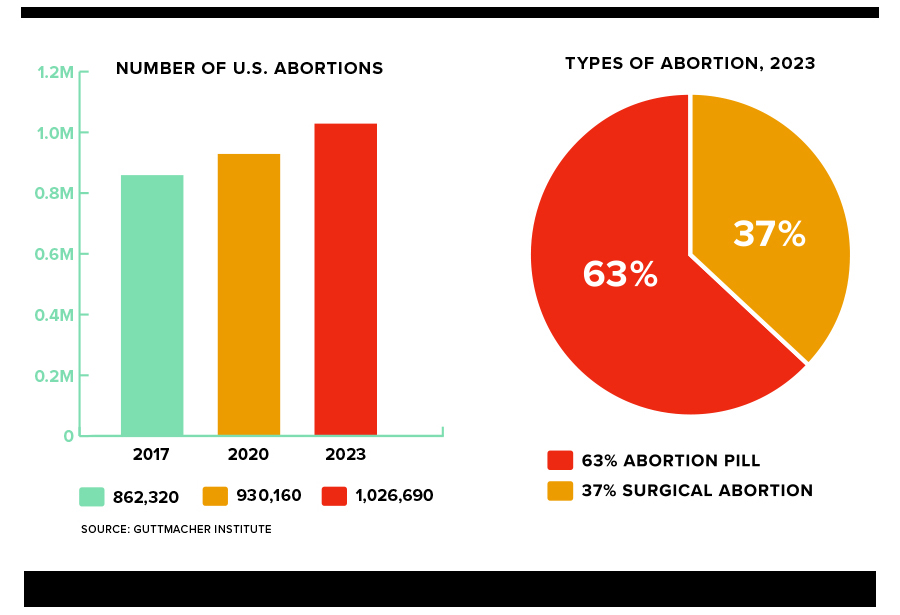In 2023, the U.S. abortion rate reached its highest level in over a decade. The estimated 1.03 million abortions recorded within the health system marked a 10% increase since 2020 and the highest number since 2011. The increase coincides with the U.S. Food and Drug Administration’s (FDA) loosening of restrictions around the abortion pill—well over half (63%) of the abortions performed in 2023 were chemical rather than surgical.
The pill regimen begins with mifepristone, which blocks production of the necessary pregnancy hormone progesterone, making the uterus unable to dispense life-giving nutrients. The second drug is misoprostol, which, taken 24-48 hours later, should cause the uterus to contract and expel a deceased baby.

On March 26, the Supreme Court heard arguments in a case challenging the FDA’s relaxation of regulations around the abortion pill. The drugs were first approved in 2000—and in 2016 and 2021, under Presidents Barack Obama and Joe Biden, regulations were abandoned that some doctors argue were medically valid. Now, women can access chemical abortion by mail delivery, without an in-person visit with a medical professional to validate gestational age and ensure the pregnancy is not ectopic.
Women have described passing babies into the toilet or bathtub who were much more fully formed than they expected, with hands, feet, fingers and toes. A New York woman sued Planned Parenthood in 2021 for allegedly giving her the abortion pill after only a 15-minute phone call, during which they assumed she was about 6 weeks pregnant. She proceeded to deliver a fully-formed, 30-week-old, stillborn baby boy.
“Women should have the ongoing care of a doctor when taking high-risk drugs,” said Erin Hawley, senior counsel at Alliance Defending Freedom (ADF). “The FDA betrayed women and girls when it unlawfully removed the necessary in-person doctor visits that protected women’s health and well-being. The FDA’s own label for abortion drugs says that roughly one in 25 women who take them will end up in the emergency room. Yet the federal government continues to defend its reckless actions that jeopardize women’s health and safety.”
Hawley represented a group of four doctors and four medical associations before the Supreme Court. She argued that the FDA’s lax regulations force the doctors to make a “hostage choice” in emergency room situations between helping save a woman’s life after abortion drug complications and violating their consciences.
“In 2021, [the FDA] eliminated the initial in-person visit based on data it says elsewhere is unreliable,” Hawley added. “And in 2016, it failed to consider or explain the cumulative effect of its wholesale removal of safeguards.”
Additionally, she argued, the FDA relies upon these doctors to care for the women harmed by the drug. “The FDA acknowledges that women are even more likely to need surgical intervention and other medical care without an in-person visit,” she said.
Pro-life observers expressed concern that the solicitor general and attorneys for the drug manufacturer Danco—as well as several of the justices—questioned whether the plaintiffs had legal standing to bring the case, since they offered no instances in which they were forced to participate in abortions. So it is possible that the court could sidestep any ruling on the drug itself and simply rule on the issue of legal standing.
A decision is expected by late June or early July.
Meanwhile, pro-life nurse practitioners in Colorado are fighting for the right to perform a treatment known as abortion pill reversal, or APR.
APR is the practice of administering progesterone in the attempt to save the unborn baby after the woman takes mifepristone and before she takes misoprostol. Thousands of lives have been saved through APR, some up to 72 hours after the mother took mifepristone but then regretted it.
In April 2023, Colorado enacted a law banning crisis pregnancy centers from advertising APR. It also banned the practice of APR unless the Colorado Medical Board, the State Board of Pharmacy and the State Board of Nursing produced rules in consultation with one another finding that APR is a generally accepted standard of practice. Colorado is the only state with such a ban on APR.
The Nursing Board and the Pharmacy Board opted to treat complaints about APR on a case-by-case basis. The Medical Board opted for the same at first, but due to pressures from pro-abortion politicians, ended up announcing that APR is not a generally accepted standard of practice.
Two Colorado nurse practitioners, Dede Chism and Abby Sinnett, have saved thousands of babies through APR. They filed a lawsuit seeking protection of their freedom to help women keep their children if they regret taking the first abortion pill. The court issued a preliminary injunction that allowed their pregnancy center, Bella Health, to continue providing APR while the lawsuit continues.
“Colorado cannot decide that certain topics are off limits for health care providers and their patients just because Colorado does not like the message that women can choose to change their minds,” the lawsuit read.
Chelsea Mynyk, another nurse practitioner who runs her own clinic that provides APR, asked to intervene in the case as another plaintiff, represented by ADF. Her request was officially granted on April 8.
“Colorado can’t silence medical professionals and prevent them from saving lives,” said ADF Senior Counsel Kevin Theriot. “The state can’t force women to follow through with an abortion when a safe alternative is available—one that Chelsea and the pro-life plaintiffs in this case can skillfully provide.” ©2024 BGEA
Photo: Anna Rose Layden / Getty Images
